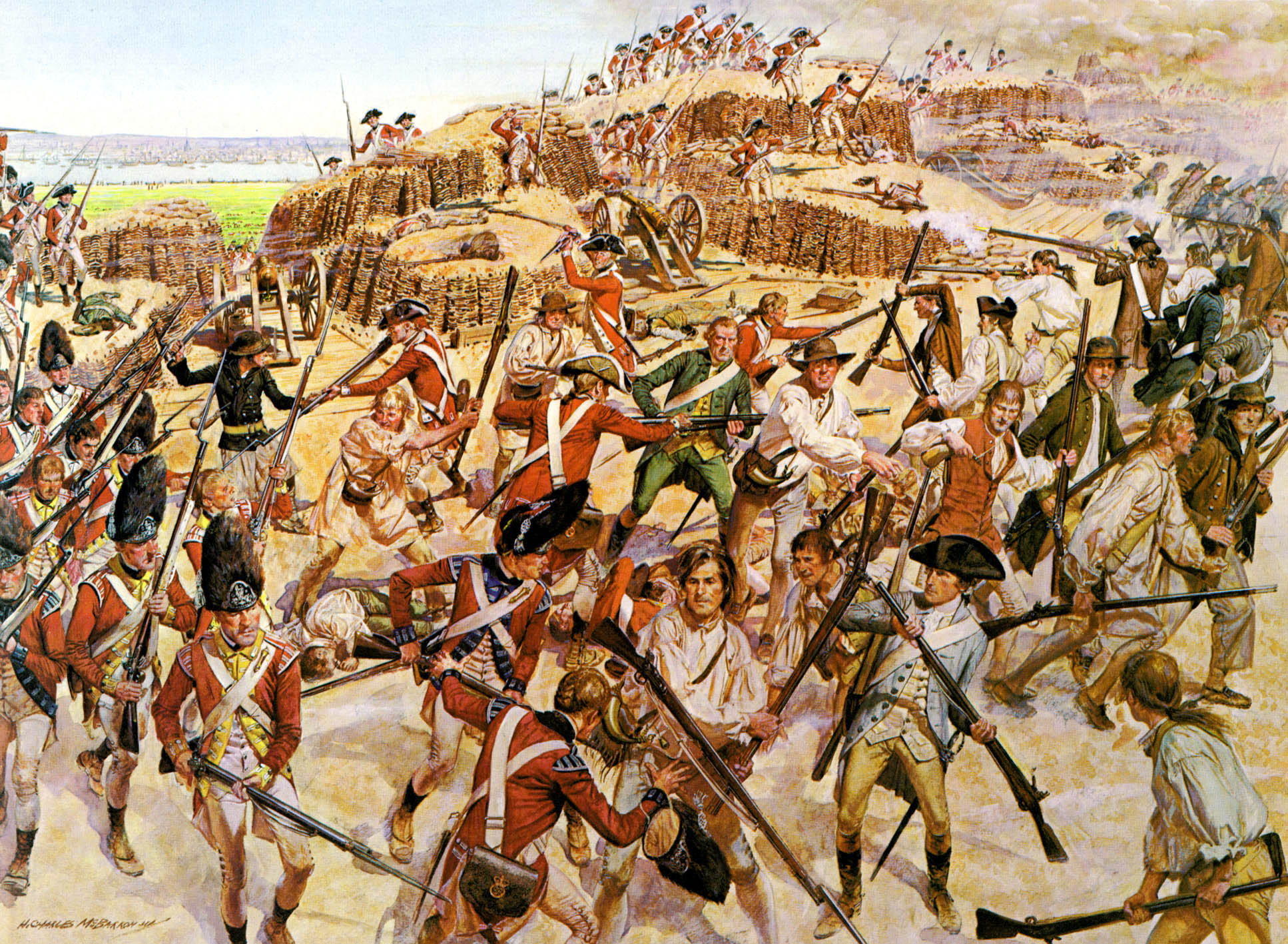Boston Campaign > Battle of Bunker Hill
Battle of Bunker Hill
Background

The Battle of Bunker Hill, fought on June 17, 1775, was one of the early and significant engagements of the American Revolutionary War. Despite being a tactical victory for the British, the battle demonstrated the determination and resilience of the American forces and served as a major boost to colonial morale.
Background:
Strategic Context:
- Following the Battles of Lexington and Concord in April 1775, British forces under General Thomas Gage were besieged in Boston by the newly formed Continental Army.
- The American forces, seeking to fortify positions around Boston, decided to occupy the Charlestown Peninsula, which overlooked Boston Harbor and the city itself. Controlling this high ground would enable them to threaten British positions in Boston.
American Objectives:
- The Americans aimed to fortify Bunker Hill, but due to a miscommunication or decision made on the ground, they began fortifying Breed's Hill, which was closer to Boston and more exposed.
- The decision to fortify Breed's Hill was led by Colonel William Prescott, who took command of about 1,200 colonial troops and began constructing fortifications on the night of June 16, 1775.
The Battle:
British Reaction:
- On the morning of June 17, British forces observed the American fortifications on Breed's Hill and realized the strategic threat they posed.
- General Gage ordered a direct assault to dislodge the Americans. The British attack was led by Major General William Howe and Brigadier General Robert Pigot, with a force of about 2,200 men.
Initial British Assault:
- The British forces crossed Boston Harbor and assembled at the base of Breed's Hill. The initial assault began with an advance up the hill, under heavy fire from American positions.
- The Americans, holding fortified positions, waited until the British were within close range before opening fire, inflicting heavy casualties. The first assault was repelled with significant British losses.
Second Assault:
- Undeterred, the British regrouped and launched a second assault. Again, they faced withering fire from the American defenders, resulting in substantial casualties and another repulsion.
- The disciplined volleys from the colonial troops demonstrated their training and resolve, surprising the British with their effectiveness.
Third Assault and American Withdrawal:
- For the third assault, the British changed tactics, advancing in a more coordinated manner and focusing on specific weak points in the American defenses.
- By this time, the Americans were running low on ammunition and supplies. As the British closed in, hand-to-hand combat ensued. The American forces, unable to hold their positions, began a strategic withdrawal.
- The British forces ultimately captured Breed's Hill and Bunker Hill, but at a tremendous cost.
Aftermath and Impact:
Casualties:
- The battle resulted in heavy casualties on both sides. The British suffered over 1,000 casualties, with 226 killed and 828 wounded. These losses were particularly severe among the officers.
- American casualties were around 450, including 115 killed and the rest wounded or captured. The high casualties reflected the intense and close-quarters nature of the fighting.
Strategic Consequences:
- Although the British won the tactical victory by capturing the hills, the high cost of the battle demonstrated the resolve and effectiveness of the American forces.
- The heavy British losses shocked the British command and Parliament, highlighting the difficulties they would face in suppressing the rebellion.
Impact on American Morale:
- The Battle of Bunker Hill served as a significant morale boost for the American forces. Despite losing the ground, the colonial troops proved they could stand up to the professional British army.
- The bravery and effectiveness of the American fighters inspired further enlistments and support for the revolutionary cause.
Military Lessons:
- The battle underscored the importance of fortifications and defensive positions. It also highlighted the need for adequate supplies, particularly ammunition, for sustained engagements.
- The British learned to respect the fighting capabilities of the American forces and adjusted their tactics accordingly in future engagements.
Significance:
- Early Major Engagement: The Battle of Bunker Hill was one of the first major engagements of the American Revolutionary War, setting the stage for future conflicts and strategies on both sides.
- Symbol of Resistance: The battle became a symbol of American resistance and determination, reinforcing the idea that the colonists were willing to fight and die for their independence.
- Leadership and Valor: Key figures, such as Colonel William Prescott and General Israel Putnam, emerged from the battle with enhanced reputations for their leadership and bravery.
The Battle of Bunker Hill remains a significant and symbolic event in American history, representing the courage and determination of the American forces in their quest for independence and serving as a reminder of the high cost of the Revolutionary War.
Boston Campaign Battles
- Battle of Bunker Hill
- Battle of Chelsea Creek
- Battle of Gloucester
- Battle of Machias
- Battles of Lexington and Concord
- Burning of Falmouth
- Fortification of Dorchester Heights
- Knox Expedition
- Paul Revere's Ride
Sources
Primary Sources
Secondary Sources
1911 Encyclopædia Britannica, Volume 4
The American Cyclopædia (1879)
See R. Frothingham, The Centennial: Battle of Bunker Hill (Boston, 1895), and Life and Times of Joseph Warren (Boston, 1865); Boston City Council, Celebration of Centen. Aniv. of Battle of Bunker Hill (Boston, 1875); G.E. Ellis, Hist. of Battle of Bunker's (Breed's) Hill (Boston, 1875); S. Sweet, Who was the Commander at Bunker Hill? (Boston, 1850); W.E.H. Lecky, History of England in the Eighteenth Century, vol. iii (London, 1883); Sir George O. Trevelyan, The American Revolution (London, 1899); Fortescue, History of the British Army, vol. iii. pp. 153 seq. (London, 1902).(R. J. M.)